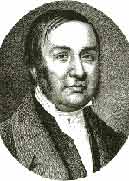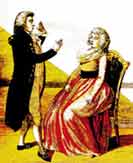Resources
Valuable resources are available for you – including NLP Practice Groups and NLP Library.
Lessons» Milton Model (21)
» Self-Hypnosis (22)
Audio/Video Contributions
» Milton Model Introduction
» Trance Induction 5-4-3-2-1
» What is Hypnosis
Text Articles
» Biography of Milton Erickson
Success Checks
» Testing 01
» Testing 02
» Testing 03
» Testing 04
History of Hypnosis
Exorcism: The Catholic priest Johann Joseph Gassner (1727-1779) believed one day that the devil wanted to possess him, and subsequently applied the exorcism rites of the Catholic Church – similar to hypnotic suggestions – successfully on himself and later on others.
Animal Magnetism: The German Franz Anton Mesmer (1734-1815) is considered a pioneer of modern hypnotherapy. According to his theory, diseases are attributed to an animal magnetism in the organism. A commission could not confirm this. However, his significant treatment successes are undisputed and are attributed to suggestive influence. Although incorrect, this approach represents the first scientific approximation to hypnosis.



James Braid (Scottish physician and surgeon, 1795-1860) coined the term 'hypnosis': Since Braid, the cause of healings is no longer sought in the person of the magnetizer and his magnetic powers, but in the patient.
Charcot (French neurologist, 1825-1893) applied hypnosis to hysteria patients with good success.
"What to do about loneliness?" many people have surely asked themselves already. Goethe wrote Werther, and Werther is lonely. Not only because of Lotte, but also because his sensitive self seems not to suffice for society. was opposed to hypnosis in later years, which is why hypnosis was less popular during Freud's creative period.
Distinction of terms
A trance state is a different state of consciousness than the usual one. Typically, the client is rather immobile and directs their attention inward to an internally recalled or generated experience. The trance state has nothing to do with sleep, but cannot be physiologically distinguished from meditation and relaxation. However, hypnosis is not equated with relaxation, as trance phenomena can also be produced without physical relaxation and the ability to be hypnotized is not trainable like relaxation. Nevertheless, the trance state is not unique and does not differ completely from everyday trances of the waking state, such as highway hypnosis or getting lost in a good book. However, the trance initiated by a hypnotherapist usually serves a very specific, positive purpose.
Hypnosis is the art or science of assisting another person in achieving an altered state of consciousness. We do this constantly, but the systematics of the method are crucial. One of the main tools is language.
Definitions'altered states of consciousness':
- Any state of consciousness that differs from your usual state.
- A state of consciousness in which your attention is so intensely focused on an object or process that all other perceptions are filtered out.
- Activity of the non-dominant brain hemisphere.
- A state of consciousness in which attention is directed inward.
Transderivational Search is the process in which meaning is sought from something said, heard, or seen from one's own memory and imagination, e.g.: 'Everyone knows times when they felt that all the things they worked for are worthless. All that they had believed in so far...'








 Early Cultures and Hypnosis: Hypnosis has been used for thousands of years in different cultures and for various purposes. Example: Temple sleep in ancient Egypt.
Early Cultures and Hypnosis: Hypnosis has been used for thousands of years in different cultures and for various purposes. Example: Temple sleep in ancient Egypt.